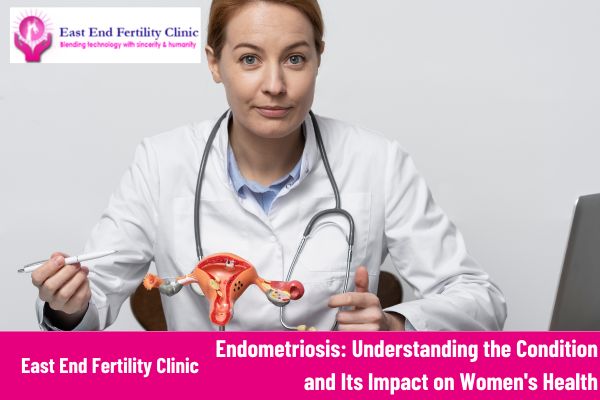Endometriosis: Understanding the Condition and Its Impact on Women’s Health
With East End Fertility Clinic
Endometriosis is a prevalent yet often misunderstood condition that affects millions of women worldwide, impacting their quality of life, fertility, and overall well-being. At East End Fertility Clinic, we understand the emotional and physical challenges faced by women living with endometriosis, and we are committed to providing personalized care, advanced treatment options, and support for those affected by this condition. In this blog, we will explain the condition, its symptoms, and how it can affect women’s health, including their fertility, and explore treatment options to improve quality of life.
What is Endometriosis?
Endometriosis is a condition where tissue similar to the lining of the uterus (the endometrium) begins to grow outside the uterus. This tissue can be found on the ovaries, fallopian tubes, and other organs in the pelvic region. Normally, during menstruation, the endometrial tissue thickens, breaks down, and sheds. However, in endometriosis, this tissue outside the uterus cannot be shed, leading to inflammation, pain, and the formation of scar tissue. Over time, this can result in pelvic pain, infertility, and other complications.
Symptoms of Endometriosis
The symptoms of endometriosis vary from woman to woman, with some women experiencing mild discomfort and others facing severe pain and complications. Common symptoms include:
- Pelvic Pain: Often one of the most noticeable symptoms, particularly during menstruation. Chronic pelvic pain is common in those with endometriosis.
- Heavy Menstrual Bleeding: Women with endometriosis may experience unusually heavy periods or bleeding between periods.
- Painful Intercourse: Pain during or after intercourse is another common symptom that can significantly affect a woman’s quality of life.
- Infertility: Endometriosis is a leading cause of infertility, affecting many women’s ability to conceive. The scarring and inflammation caused by endometrial tissue growing outside the uterus can damage reproductive organs.
- Painful Bowel Movements or Urination: Especially during menstruation, women may experience discomfort when using the bathroom.
Impact of Endometriosis on Women’s Health
Endometriosis can significantly impact a woman’s life, not only because of the chronic pain but also because of its effect on fertility. At East End Fertility Clinic, we recognize the emotional and physical toll that this condition can take on women. Infertility is a common concern for women diagnosed with endometriosis, though many women with endometriosis are still able to conceive with the right support and treatment.
Aside from fertility issues, endometriosis can also lead to:
- Chronic Fatigue: Due to constant pain and the emotional strain of living with the condition.
- Mental Health Challenges: Many women with endometriosis experience anxiety, depression, and stress due to the chronic pain and uncertainty surrounding their fertility.
- Interference with Daily Life: The condition can affect a woman’s ability to work, participate in social activities, and maintain an active lifestyle.
How is Endometriosis Diagnosed?
The diagnosis of endometriosis often requires a combination of medical history evaluation, physical exams, imaging tests (such as ultrasounds), and the definitive method: laparoscopy. Laparoscopy is a surgical procedure that allows doctors to see inside the abdomen and confirm the presence of endometrial tissue growing outside the uterus. This is the most accurate way to diagnose endometriosis.
Treatment Options for Endometriosis
While there is no cure for endometriosis, several treatment options are available to help manage symptoms and improve quality of life:
- Medications:
- Pain Relief: Over-the-counter pain relievers like ibuprofen or prescribed medication can help manage pain.
- Hormonal Therapies: Birth control pills, hormonal IUDs, and other hormone therapies can help regulate menstruation and reduce symptoms.
- Surgical Treatments:
- Laparoscopic Surgery: This minimally invasive surgery involves the removal or destruction of endometrial tissue and scar tissue. For women struggling with infertility, surgery can improve reproductive outcomes.
- Hysterectomy: In severe cases, when other treatments fail, removing the uterus may be considered.
- Fertility Treatments:
- If a woman with endometriosis is struggling to conceive, assisted reproductive technologies like in vitro fertilization (IVF) may be recommended. At East End Fertility Clinic, we specialize in helping women with fertility challenges related to endometriosis.
- Lifestyle and Support:
- Managing stress through relaxation techniques, maintaining a healthy diet, and regular exercise can also help alleviate symptoms.
Living with Endometriosis
Living with endometriosis requires an individualized approach. The condition can affect various aspects of life, from work and relationships to mental health. At East End Fertility Clinic, we offer personalized care that focuses not only on medical treatment but also on emotional support. Women living with endometriosis should feel empowered to seek support from healthcare professionals and connect with others who understand their experiences.
Conclusion
Endometriosis is a chronic condition that significantly impacts many aspects of a woman’s life, especially her reproductive health. Early diagnosis, effective treatment, and ongoing support can help manage symptoms and improve quality of life. At East End Fertility Clinic, we are committed to providing comprehensive care and advanced fertility treatments to support women with endometriosis in their journey toward better health and fertility.
If you suspect you may have endometriosis or have been struggling with symptoms, we encourage you to schedule a consultation with our team of specialists at East End Fertility Clinic to explore your options for treatment and care.

